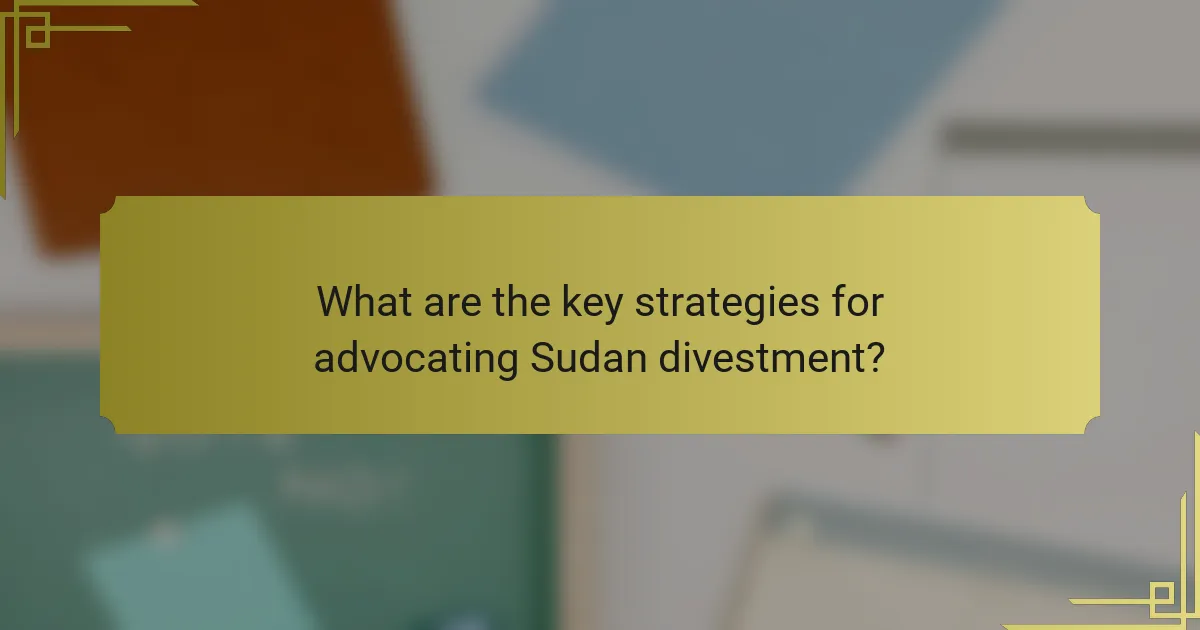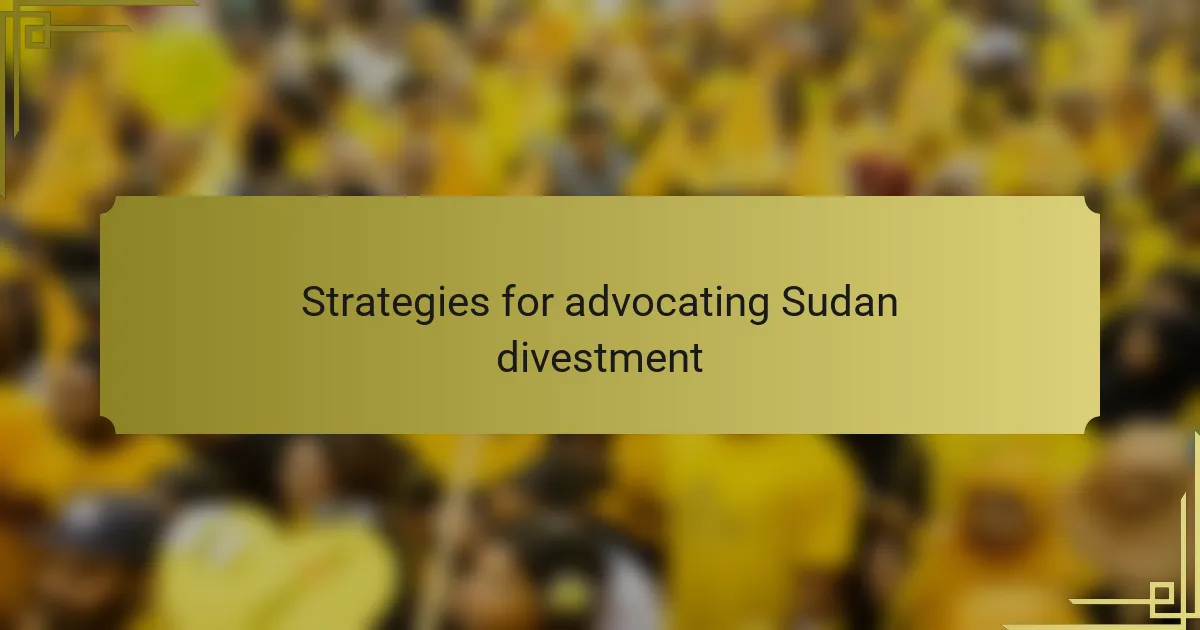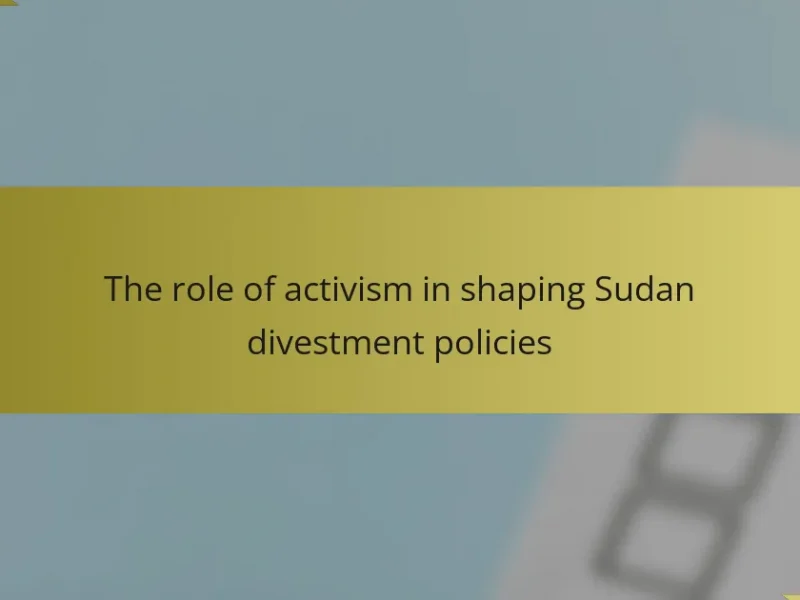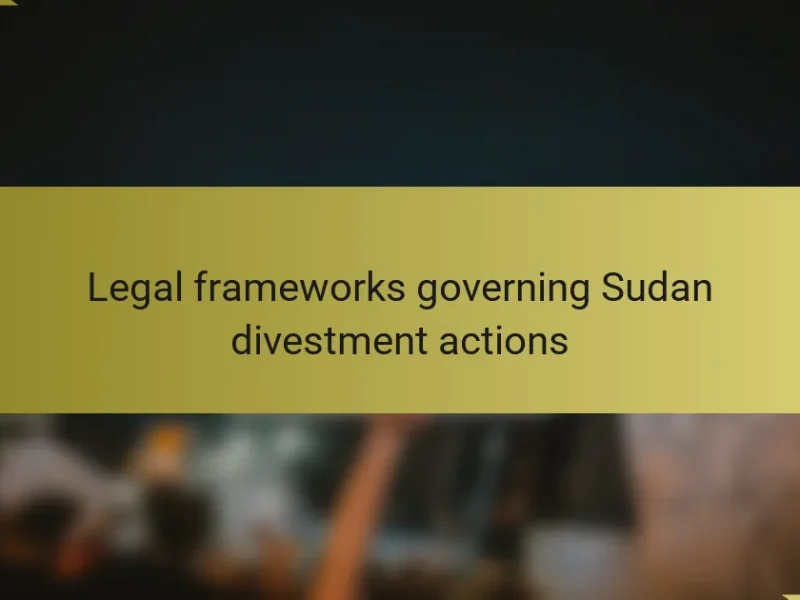The article focuses on strategies for advocating Sudan divestment, emphasizing the importance of raising awareness, building coalitions, and engaging policymakers. Raising awareness involves educating the public about human rights abuses in Sudan through various platforms such as campaigns and social media. Building coalitions with like-minded organizations enhances advocacy efforts, while collaboration with human rights and faith-based groups amplifies the message. Engaging policymakers is essential for enacting legislative change, with advocates encouraged to lobby for divestment legislation at multiple government levels. The article also highlights the effectiveness of using successful divestment examples and economic data to strengthen the case for divestment from Sudan.

What are the key strategies for advocating Sudan divestment?
Key strategies for advocating Sudan divestment include raising awareness, building coalitions, and engaging policymakers. Raising awareness involves educating the public about the human rights abuses in Sudan. This can be done through campaigns, social media, and community events. Building coalitions with organizations that share similar goals enhances the advocacy efforts. Collaborating with human rights groups and faith-based organizations can amplify the message. Engaging policymakers is crucial for legislative change. Advocates should lobby for divestment legislation at local, state, and national levels. Providing concrete examples of successful divestment in other contexts can strengthen the argument. Additionally, utilizing economic data to show the impact of divestment on Sudanese authorities can be persuasive.
How can grassroots movements influence Sudan divestment efforts?
Grassroots movements can significantly influence Sudan divestment efforts by mobilizing public opinion and raising awareness. These movements often utilize social media campaigns to inform the public about the humanitarian crises in Sudan. They can organize protests and demonstrations to draw attention to divestment issues. Additionally, grassroots groups may engage with local communities to build support for divestment initiatives.
Research shows that collective action can lead to increased pressure on corporations and governments to divest. For instance, the Sudan Divestment Task Force successfully advocated for divestment from companies operating in Sudan, influencing major investment firms. Their efforts resulted in billions of dollars being withdrawn from Sudanese investments.
Grassroots movements also collaborate with non-governmental organizations to amplify their message and reach broader audiences. They often provide resources and tools for individuals to take action, such as petitions and letter-writing campaigns. This grassroots approach creates a network of informed advocates, further strengthening the divestment movement.
What tactics can grassroots movements employ to raise awareness?
Grassroots movements can employ various tactics to raise awareness. Social media campaigns are effective for reaching a broad audience quickly. Hosting community events can create local engagement and foster discussion. Collaborating with local organizations can amplify the message and resources. Distributing informative materials, such as flyers and brochures, helps educate the public. Engaging in public demonstrations raises visibility and attracts media attention. Utilizing storytelling can personalize the cause and resonate emotionally with potential supporters. These tactics have been successfully used in multiple movements to mobilize support and create awareness.
How do community events contribute to advocacy for divestment?
Community events play a crucial role in advocating for divestment by raising awareness and mobilizing support. These events create platforms for education about the impacts of investment in harmful sectors. They facilitate discussions among community members, fostering a collective understanding of divestment’s importance. Engaging activities can amplify messages and attract media attention, increasing visibility for the cause.
Additionally, community events often feature speakers and experts who provide credible information, enhancing the legitimacy of the advocacy efforts. They can also serve as fundraising opportunities, supporting campaigns aimed at divestment. Studies show that grassroots movements, bolstered by community events, have historically influenced policy changes and corporate behaviors. For instance, the divestment movement against apartheid in South Africa gained momentum through local activism and community engagement.
What role do financial institutions play in Sudan divestment advocacy?
Financial institutions play a crucial role in Sudan divestment advocacy by influencing investment decisions and promoting ethical practices. They can implement policies that restrict funding to companies operating in Sudan. This action pressures these companies to reconsider their involvement due to reputational risks. Financial institutions also engage in shareholder advocacy, urging companies to divest from Sudan. They provide platforms for dialogue between investors and companies regarding human rights concerns. By leveraging their financial power, these institutions can amplify the call for divestment. Reports indicate that significant financial institutions have already committed to such divestment strategies in response to advocacy efforts. This collective action fosters a broader movement aimed at addressing the humanitarian issues in Sudan.
How can investors leverage their influence to promote divestment?
Investors can leverage their influence to promote divestment by utilizing their financial power and public platforms. They can engage in shareholder activism to advocate for companies to divest from Sudan-related investments. This involves filing resolutions, voting on corporate policies, and publicly communicating their stance. Additionally, investors can collaborate with advocacy groups to amplify their message. They can also use social media to raise awareness and mobilize public support. By highlighting the ethical implications of investments in Sudan, investors can create pressure on companies to change their policies. Historical examples show that coordinated investor actions have successfully led to divestment in other contexts, proving the effectiveness of this strategy.
What are the ethical considerations for financial institutions regarding Sudan?
Financial institutions face significant ethical considerations regarding Sudan due to the country’s ongoing human rights violations. These institutions must evaluate their investments in companies operating in Sudan that may contribute to or benefit from these violations. Compliance with international sanctions is crucial for ethical operations. Financial institutions should also consider the implications of funding entities linked to conflict or oppression. Transparency in their financial dealings is essential to maintain public trust. Engaging in responsible investment practices can mitigate reputational risks. Institutions are encouraged to support initiatives that promote human rights and sustainable development in Sudan.
Why is public awareness crucial for Sudan divestment advocacy?
Public awareness is crucial for Sudan divestment advocacy because it mobilizes support and influences decision-makers. Increased public knowledge about the situation in Sudan can lead to greater pressure on corporations and governments to divest. Awareness campaigns can educate the public about the human rights violations and conflicts in Sudan. This understanding can create a sense of urgency and moral obligation to act. Historical examples show that public pressure can lead to significant policy changes. The divestment movement against apartheid in South Africa is a notable case where awareness played a key role. In that instance, widespread public support led to economic sanctions and ultimately contributed to the end of apartheid. Therefore, public awareness is essential to drive action and effect change in Sudan divestment advocacy.
What strategies can be used to educate the public about Sudan divestment?
Effective strategies to educate the public about Sudan divestment include community outreach, social media campaigns, and educational workshops. Community outreach can involve partnerships with local organizations to disseminate information. Social media campaigns can leverage platforms like Twitter and Facebook to spread awareness and engage discussions. Educational workshops can provide detailed insights into the implications of divestment. Research indicates that informed communities are more likely to support divestment efforts. According to a 2020 study by the Sudan Divestment Task Force, increased public awareness led to a 30% rise in divestment actions among institutions. These strategies collectively enhance understanding and mobilize support for Sudan divestment initiatives.
How can social media campaigns enhance public engagement?
Social media campaigns enhance public engagement by facilitating direct communication between organizations and the public. They allow for real-time interaction, fostering a sense of community. Campaigns can share compelling narratives that resonate emotionally with audiences. Visual content, such as videos and infographics, captures attention and encourages sharing. Hashtags create a unified message, making it easier for users to engage with specific topics. Statistics show that social media can increase awareness; for instance, campaigns can reach millions within hours. Engaging content drives discussions, leading to higher participation rates in advocacy efforts.
What are the challenges faced in advocating for Sudan divestment?
Advocating for Sudan divestment faces several challenges. One major challenge is the complexity of Sudan’s political landscape. The ongoing conflict and instability make it difficult to establish clear divestment goals. Additionally, there is a lack of public awareness about the issues in Sudan. Many individuals and organizations may not understand the implications of their investments.
Economic factors also pose significant hurdles. Many investors are reluctant to divest due to potential financial losses. This reluctance is often exacerbated by the lack of viable alternative investment options. Furthermore, there may be legal barriers to divestment. Some investors face contractual obligations that complicate their ability to withdraw funds.
Another challenge is the influence of lobbying groups. These groups may advocate for continued investment in Sudan for economic reasons. Their efforts can hinder divestment campaigns. Lastly, coordinating efforts among various stakeholders can be difficult. Different organizations may have differing priorities, which can lead to fragmented advocacy efforts.
How can advocates overcome resistance from corporations?
Advocates can overcome resistance from corporations by employing strategic communication and building coalitions. They should present clear, data-driven arguments that highlight the benefits of divestment. For instance, studies show that ethical investment can enhance corporate reputation and customer loyalty. Advocates can also engage in dialogue with stakeholders to address concerns and misconceptions. Utilizing case studies of successful divestment can provide compelling evidence. Furthermore, leveraging social media campaigns can mobilize public support, increasing pressure on corporations. By demonstrating the financial and ethical imperatives, advocates can effectively shift corporate perspectives on divestment.
What legal hurdles might impede divestment efforts?
Legal hurdles that might impede divestment efforts include regulatory restrictions and contractual obligations. Regulatory restrictions can limit the ability of investors to divest from certain sectors or entities. For example, laws may require investors to maintain certain holdings for compliance reasons. Contractual obligations may bind investors to long-term agreements that complicate divestment. Additionally, potential litigation risks can arise from stakeholders who oppose divestment actions. These legal challenges can slow down or prevent effective divestment strategies from being implemented.
What successful case studies exist in Sudan divestment advocacy?
Successful case studies in Sudan divestment advocacy include the efforts of the Sudan Divestment Task Force (SDTF). The SDTF successfully mobilized investors to withdraw from companies operating in Sudan. Their campaign highlighted the connection between investments and the Sudanese government’s human rights abuses.
Another notable case is the divestment movement led by universities. Institutions like Harvard and Stanford adopted divestment policies from Sudan-related investments. This resulted in significant financial pressure on companies linked to the Sudanese regime.
Additionally, the advocacy efforts of organizations such as Amnesty International and Human Rights Watch played a crucial role. They provided extensive research and reports on the human rights situation in Sudan. This information empowered activists and investors to take action against unethical investments.
Furthermore, the implementation of the Darfur Peace and Accountability Act in 2006 marked a legal framework supporting divestment. This act encouraged public pension funds to divest from companies involved in the Sudanese conflict.
These case studies illustrate effective strategies in advocating for divestment from Sudan, leading to tangible changes in investment practices.
Which organizations have made significant impacts in this area?
Organizations that have made significant impacts in advocating for Sudan divestment include the Sudan Divestment Task Force (SDTF) and the Enough Project. The Sudan Divestment Task Force mobilized grassroots campaigns to encourage divestment from companies operating in Sudan. They provided resources and reports to investors and institutions. The Enough Project focuses on policy advocacy and raising awareness about human rights violations in Sudan. They work to influence U.S. policy and promote accountability. Both organizations have collaborated with universities and pension funds to promote divestment strategies. Their efforts have led to significant financial pressure on the Sudanese government.
How did specific campaigns achieve their goals?
Specific campaigns achieved their goals by utilizing targeted messaging and grassroots mobilization. They focused on raising awareness about the humanitarian crisis in Sudan. Campaigns employed social media to amplify their reach and engage supporters. They organized protests and events to draw public attention and media coverage. Collaborations with NGOs enhanced credibility and resources. Strategic partnerships with influential figures helped to garner support. They utilized data and reports to provide evidence of the need for divestment. These methods collectively increased pressure on companies and institutions to divest from Sudan.
What best practices can enhance Sudan divestment advocacy efforts?
Effective best practices for enhancing Sudan divestment advocacy efforts include building coalitions, utilizing data-driven campaigns, and engaging in grassroots mobilization. Building coalitions with NGOs and community organizations amplifies the message and increases reach. Data-driven campaigns that highlight the economic and ethical implications of investment in Sudan can persuade stakeholders. Grassroots mobilization encourages community involvement and raises awareness about the issues in Sudan. Additionally, leveraging social media platforms helps to disseminate information quickly and engage a broader audience. Regularly updating supporters with progress and actionable steps keeps the momentum going. These strategies have been shown to lead to more impactful advocacy efforts in various contexts.
How can collaboration between various organizations improve outcomes?
Collaboration between various organizations can improve outcomes by leveraging diverse resources and expertise. This approach fosters innovation and enhances problem-solving capabilities. For example, partnerships can combine funding, knowledge, and networks, leading to more effective advocacy. Research shows that collaborative initiatives often yield higher success rates. A study by the Stanford Social Innovation Review indicates that cross-sector collaborations can increase impact by 30%. By aligning goals, organizations can create unified strategies that amplify their voices. This synergy helps to mobilize communities and drive policy changes more effectively.
What are the most effective communication strategies for advocates?
The most effective communication strategies for advocates include clear messaging, storytelling, and active listening. Clear messaging ensures that the core issue is easily understood. Advocates should use simple language and avoid jargon. Storytelling engages the audience emotionally. Personal stories can illustrate the impact of divestment. Active listening builds trust and rapport. It allows advocates to address concerns and adapt their messages. Research shows that emotional appeals can increase persuasion by 50%. This highlights the importance of combining facts with relatable narratives.
The main entity of the article is “Sudan divestment advocacy.” The article outlines key strategies for advocating divestment from Sudan, including raising awareness, building coalitions, and engaging policymakers. It discusses the role of grassroots movements in influencing divestment efforts, highlighting effective tactics such as social media campaigns and community events. The article also examines the impact of financial institutions and investors on divestment, ethical considerations, challenges faced in advocacy, and successful case studies that demonstrate effective strategies. Additionally, it emphasizes best practices and communication strategies to enhance advocacy outcomes.


